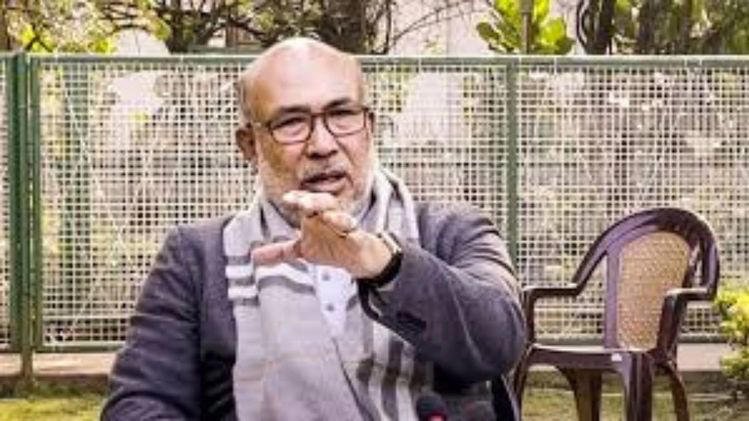The apex court had made it clear that no individual, regardless of position, will be shielded if implicated in wrongdoing. This landmark hearing comes as the Kuki-Zo community continues to press for an impartial probe and accountability for the violence that rocked Manipur.
BY PC Bureau
New Delhi-July 21, 2025: The Supreme Court is expected to hear the explosive Biren Singh audio tape case on during the week beginning July, 21.
The petitioners are pressing for a court-monitored probe into audio clips that allegedly feature the former Manipur Chief Minister, N. Biren Singh, making inflammatory and potentially incriminating remarks during the height of last year’s ethnic clashes.
In the last hearing on May 5, the Supreme Court bench led by Chief Justice Sanjiv Khanna expressed displeasure with the Central Forensic Laboratory’s (CFL) sealed report on the authenticity of the tapes. The CFL had been tasked to independently verify the leaked recordings after Truth Labs, a private forensic agency, had concluded that the tapes were genuine and untampered.
“What is this FSL report?” Chief Justice Khanna had asked Solicitor General Tushar Mehta, frowning as he leafed through the sealed envelope submitted by the Centre. The bench, also comprising Justice Sanjay Kumar, emphasized that the court is “not here to protect any individual involved in wrongdoing” and made it clear that institutional credibility was on the line.
READ: Part 3: A Roadmap for Green Farming in the Northeast Hills
The Kuki Organisation for Human Rights Trust (KOHUR), which filed the petition, argues that the tapes implicate Singh in fanning communal violence between the Meitei and Kuki-Zo communities in May 2023 — clashes that claimed hundreds of lives, displaced tens of thousands, and left scars that have yet to heal.
Despite attempts by the Solicitor General to question the credentials of KOHUR — calling it a “rookie” body — the bench dismissed such objections. “We are not concerned. Let us ignore the petitioner… but if something wrong has been done, we don’t have to protect the wrongdoer,” Chief Justice Khanna had said firmly.
Upset over CFSL Report into Biren Singh Tape, SC Seeks Fresh Lab Analysis#CFSL@pbhushan1 #BirenSingh #SupremeCourt #ForensicReport #Kohur https://t.co/XMk6hXW70s
— POWER CORRIDORS (@power_corridors) May 5, 2025
At the heart of tomorrow’s hearing lies a clash of forensic narratives. The Truth Labs report, submitted by the petitioner in March, had meticulously verified that the leaked audio tapes were authentic and featured the voice of Biren Singh. Based on waveform analysis, pitch contour matching, and linguistic consistency, the lab stated “with high confidence” that the voice in the tapes had not been manipulated.
In stark contrast, the CFL report — presented in a sealed envelope and not even read by the Solicitor General at the time — failed to offer clarity on the tapes’ authenticity, either by omission or obfuscation. The court was aghast, with the CJI instructing Mehta: “Read the contents and then talk to your offices. Please examine and bring a fresh report.”
READ: China Begins Work on Brahmaputra Dam Near Indian Border
The court had then given two weeks to the Union government to submit a revised and thorough report, taking note of the public interest and grave communal implications. The Court had directed that the case will be listed in the week beginning July 21.
For the Kuki-Zo community, this case has become a crucial litmus test of the Supreme Court’s resolve to deliver justice and accountability. Multiple Kuki civil society organisations, including the Indigenous Tribal Leaders’ Forum (ITLF) and the Kuki Inpi Manipur (KIM), have openly stated that they are looking to the apex court as “the last institution standing between truth and impunity.”
“This is not just about a voice on a tape. This is about truth, justice, and dignity,” said Neichakhai Doungel, a community leader from Churachandpur. “We hope the Supreme Court gives us reason to believe again.”
The imposition of President’s Rule in Manipur in February 2025, shortly after Singh’s resignation, created a new context for this investigation. However, questions persist about the role of the state machinery and whether previous probes were compromised due to political influence.
READ: Editorial | Kanwariyas Vs Jawan: A Nation’s Shame
Advocate Prashant Bhushan, representing the petitioners, had earlier raised concerns that the investigation being led by the state police itself was a conflict of interest, given the allegations were against the former Chief Minister. The CJI responded by noting that President’s Rule “should take care of that argument,” though Bhushan remains unconvinced.
As the Supreme Court reopens the case tomorrow, legal observers say the court faces a pivotal moment. The outcome could impact not just one political career, but the larger narrative of communal justice and reconciliation in Manipur. And for the Kuki-Zo community, it could mark a long-overdue step toward official recognition of their trauma.














